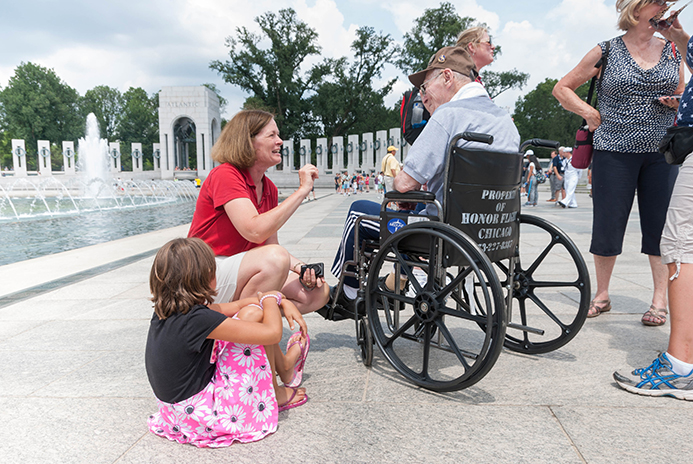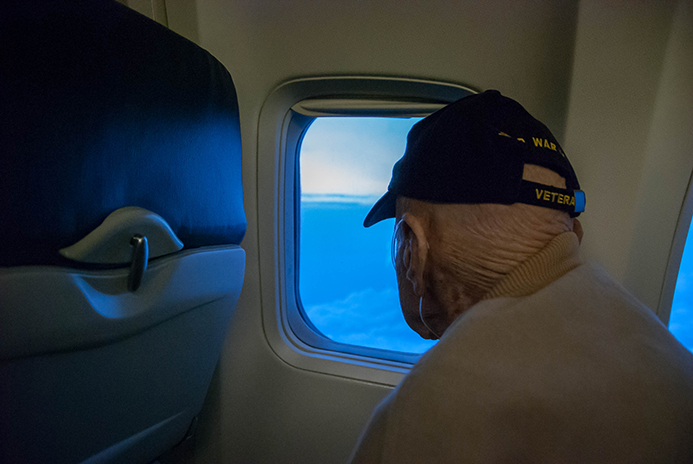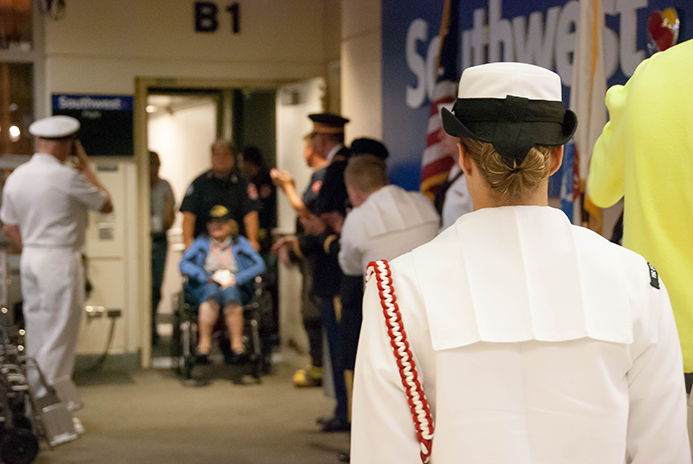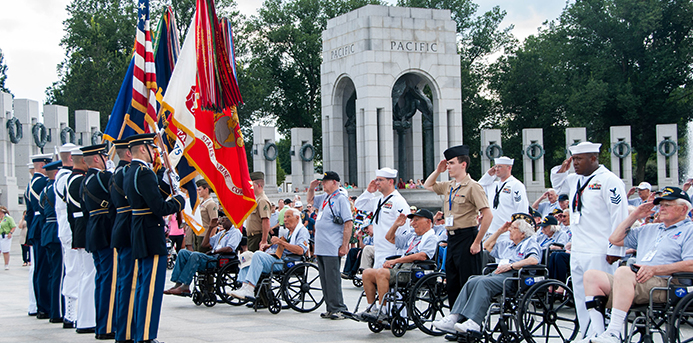4 a.m., Midway Airport: Honor Flight Chicago’s volunteers are assembling tickets, wheelchairs, dog tags and oxygen tanks. In Washington D.C., policemen review motorcade routes. Security teams at Midway and Dulles double-check arrangements: This group will not be delayed. They will skip checkpoints, queues and stop signs. On July 29, Honor Flight Chicago gave 86 World War II veterans the trip of a lifetime, and I was lucky enough to join them.
The National World War II Memorial, completed in 2004, stands between the Washington and Lincoln Monuments. Most surviving veterans have consigned themselves to never seeing it. But Honor Flight set out to change that, and became what CEO Mary Pettinato calls “Make-a-Wish for Seniors”—a day to honor the generation that secured democracy for the 20th century. Each Honor Flight hub is run independently, and Chicago’s organization maintains an intense schedule—over 426 veterans flew this year alone.

With an average age of 91, taking 86 veterans, most of them in wheelchairs, on a one-day trip to D.C. is a massive undertaking. But Honor Flight makes it look effortless. Each veteran has a caretaker/companion; some are active-duty military. Volunteers provide meals and snacks, and distribute water and cool washcloths to beat back the brutal heat. A volunteer medical team travels with Honor Flight; “ground crews” in Chicago and D.C. manage airport logistics. And the veterans travel like kings: their flight is a private charter, and their buses cut through traffic with a police escort.
Many are in fragile health. Al, an infantryman in the Pacific, is assigned a full-time nurse, Abby, who waited a year to be on an Honor Flight in memory of her grandfather. With Al on oxygen and confined to his wheelchair, Abby seamlessly monitors his vitals, changes his O2, and speaks with his wife to reassure her that Al is in good hands. By the end of the day, Al and Abby joked like old friends, and Al said he’d never felt better.

Thanks to this volunteer army, the veterans leave every care behind. They are free to concentrate on what the day means to them and share their memories. They attend a color guard ceremony at the memorial, see the National mall, and visit the Air & Space Museum. Veterans who had not spoken of the war for 70 years reflect on their experiences. And they repeat one word over and over: “Lucky.” When I asked a vet how he was enjoying the day, he said “Oh, I’ve been lucky since Bastogne”—meaning the Bulge, one of the deadliest sieges of the war.
“I never got shot at! I was so lucky. The Germans, they shelled us, and I heard them charging and shooting to my right and to my left, but I was in the one section they didn’t hit. I was so scared. But every day since then, I just know I’ve been lucky.”
Taking part in an Honor Flight humanizes the conflict like nothing else. It is mesmerizing. The stories put faces and emotions to events I knew only from movies. Petty Officer Lee Hoffman has volunteered with 14 Honor Flights, and he says, “It’s an addicting emotional experience. You can’t stop.” Not usually how young people describe hanging out with 90-year-olds, but it’s true. Everywhere we went, bystanders stopped to shake hands; some canceled meetings just to talk for a while.
There were six female veterans, and we detoured to the Women In Military Service for America Memorial. The women were thrilled that their rank, service records and photos appeared on a huge digital screen, preserved for posterity. Marie Bertsch, who ran a supply depot, was delighted to discover the original uniforms on display. The hat, she joked, was the reason to join up.
Every vet brushed off praise. Someone else was always the hero. They never asked for the day’s riches, and constantly thanked everyone for their hard work.
But the biggest surprise was yet to come. On the return flight, the P.A. announced, “Mail Call!” Suddenly, every veteran received a stack of letters—from family, friends, school groups, strangers, all thanking them for their service.
And then we landed in Chicago.
In 1945, a war-weary nation gave each veteran a one-way ticket back home, nothing more. Thanks to Honor Flight, the veterans receive the hero’s welcome they have earned. And it has to be seen to be believed.
Deplaning, the veterans are stunned when they are greeted by a full military honor guard from Great Lakes Naval Base, a full complement of bagpipers, a 40-person brass band, and 2,000 cheering Chicagoans.
They parade through Midway Airport’s main concourse, each with a military escort, past hundreds of American flags and well-wishers. The scene is pandemonium.

There is no space more tightly controlled than a modern airport; watching one turned into a parade ground is perhaps the grandest gesture of all. It takes over an hour for the veterans to work their way through the crowd of well-wishers—and at the end, their families greet them with banners bearing their names.
Honor Flight Chicago flies again on Sept. 2, and they are always looking for more people to lend a voice to the welcome home parade. And if you know a veteran, help them apply, and Honor Flight will see to it that they have a day they’ll never forget.
Anyone who knows a World War II veteran living in the Chicago area, or able to travel to Chicago to board an honor flight, is encouraged to visit honorflightchicago.org or call 773-227-VETS (8387) for additional information and a veteran application.
More from Make It Better

